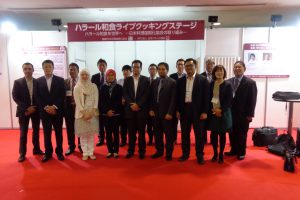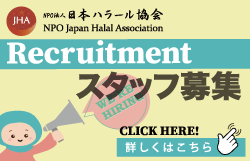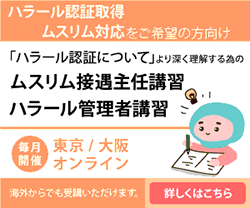History of the Association Establishment
I spent a total of 10 years in Malaysia and the UAE, and and embraced Islam from Buddhism after reading the Holy Quran. In 2009, when I returned home for the first time as a Muslim, and faced with not being able to eat the same meal as my family. Halal meat, which is easily available overseas, can only be purchased in Japan without going to a halal shop that takes an hour and a half by train. In addition, the meat we could buy was a hard meat that was not very suitable for Japanese meals. I wondered how I could make this changed to be able buy delicious, fresh meat.
Being as Japanese and Muslims, we believe that it is our responsibility for the next generation who live in this country in the future, and in 2010 we established the Non profit Organization Japan Halal Association together with three other directors as an organization that is sustainable and can achieve halal certification according to international standards.
The decision of becoming the host country of the Olympic games was an opportunity for the halal industry to attract attention
In 2013, the Olympic games were decided to be held in Japan. Restrictions on obtaining tourist visas to Japan have been eased, export goods have been promoted, and it has become a tailwind for the halal industry in Japan. With the increase in the number of tourists visiting Japan, there was an urgent need to improve the system for accepting Muslim tourists at restaurants, accommodations, and commercial facilities, and seminars by companies and governments were held throughout the country, and services for Muslims were launched. We, the board members, talked about “What is Islam and what is halal?” in the every seminars all through Japan. And facilitated restaurants and prayer facilities.
On the other hand, with regard to export products such as food, many companies came to consult us because of the misunderstanding that “anything can be sold as long as it acquires halal certification”, but there were also products that did not require halal certification in the first place or products that did not match the tastes of Muslim consumers. Since it takes time and cost to obtain certification, it should proceed to acquire certification after proper investigation and consideration, but there seemed to be many companies that thought that “as long as you get certification, you can sell” easily following the boom.
In such a case, “We do not certify anything that does not require halal certification.” or “Please try selling it once without halal certification, and if it really meets the needs of the consumer and requires halal certification, please contact us again.” we had no choice but to refuse as such. Around 2016, the boom finally subsided, and the number of companies rushing to acquire certification as it was swept away by trends decreased, and only companies that really need halal certification acquired it.
Ten years after the establishment of the Association (as of 2022)
As the COVID-19 spread around the world in 2019 and many companies and individuals were affected, but the inquiries for Halal certification did not drop and constantly inquired by companies such as major pharmaceutical companies and raw material manufacturers. Although the reasons for inquiries were varied, such as the impact of the enforcement of the JPH Law in Indonesia and the continued demand for halal certification from business partners due to steady food exports even during the COVID-19, we continued to conduct certification audits under a limited environment, such as conducting remote audits in response to remote work by companies and prohibitions on factory entry. In addition, online shopping has spread due to the COVID, and the number of online halal shops in Japan has also increased. In 2022, about 10 years after the establishment of the Association, it became easy to purchase halal meat and food with a single mobile phone at any time. In addition, mosques and halal-compatible restaurants are scattered in major cities and rural areas, and prayer facilities have been established at train stations, airports, and commercial facilities, and the environment for Muslims has changed considerably. As the number of opportunities to be covered by the media about halal and Islam has increased, the number of people who say that they “know something about it” has increased, and even compared to 10 years ago, I feel that the understanding of the Muslim way of life in Japan has deepened. In the background Japan not only Muslims but also the idea of respecting and accepting different cultures, different customs, and different ideas has spread in Japan. I believe that this is also the result of the efforts of many people who involved in various fields in other organizations, governments, companies, etc. who did their best. With regard to the Association’s halal certification activities, with the aim of becoming an international and reliable halal certification body, we have incorporated overseas audit methods and certification standards in a manner that suits the Japan, created certification standards unique to the Association, trained auditors, and developed audit methods, and have repeated trial and error. Among them, there were mistakes, problems arose, special human resources such as halal certification auditors could not be secured, and there were times when we were so stuck that even I wanted to quit. However, with the support of the staff, board members, auditors, and related parties, the small efforts of each and every one of us have accumulated to where we are today. The Association is built on the cooperation of all of you. I would like to express my heartfelt gratitude and gratitude to everyone who was involved, and at the same time, I would like to ask for your continued cooperation in the future.
Responsibility for the Next Generation
In recent years, the elimination of barriers based on race, ethnicity, and religion has come to be raised as a social significance, but there are also various issues for Muslims living in Japan. Some of them are difficult to realize. For example, grave yard shortage problems, school lunches, Islamic education, marriages and divorces, ceremonies, access to fresh meat, etc. In order to realize these goals in Japan, it is necessary to seek solutions together with Japanese society. In order to do so, it is first necessary for the society to get to know “Islam” and “Muslims”, and conversely, Muslims need to understand the society of Japan. Islam does not have a specific culture. By adapting the culture of Japan, it becomes the form of “Islam of Japan”. It is not that the Japan is Islamized, but that Islam can exist in the culture of the Japan, and that Islam is close to the Japan society. This may be difficult to achieve in our generation, but I would like to at least lay the foundation for entrusting it to the next generation. One of our social activities is student support, and that is part of this. Children are the treasure that will create society after us. Muslim children also go out into society and bear the responsibility. I hope that the future of Japan, society cannot co-exist just because “I am a Muslim” or “I do not know Islam”. We will do our best to “let people know” in our generation and strive to sustain this Association in a sustainable way.















